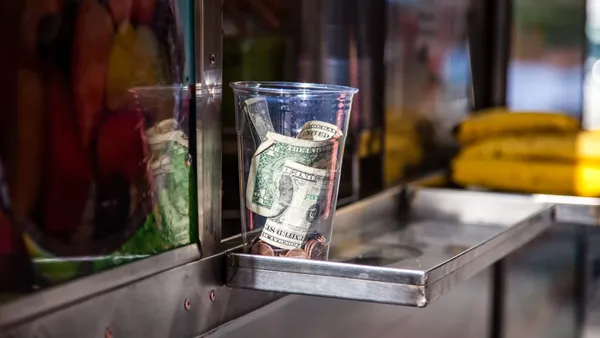Dive Brief:
- One Fair Wage launched a $10 food safety training program on Wednesday as an alternative to the National Restaurant Association’s widely used ServSafe program, which costs restaurant workers $15 each.
- The Just.Safe.Food program is owned and operated by restaurant workers, and “profits raised from employers paying for their workers to get food handler training go back to advocacy organizations working to raise workers’ wages and benefits,” according to a OFW press release emailed to Restaurant Dive.
- The announcement follows a report by The New York Times that found the NRA uses restaurant workers’ ServSafe payments to fund its lobbying efforts, which include blocking increases to the minimum and subminimum wage. The New York Times reported most restaurant workers who pay for ServSafe are unaware that it funds NRA lobbying.
Dive Insight:
ServSafe is used heavily in California, Florida, Illinois and Texas, according to The Times. OFW is calling on legislators to pass laws that would end what it claims to be mandatory payments for ServSafe training by foodservice workers.
“Restaurants like Applebee’s and Olive Garden make millions of dollars by paying restaurant workers a federal subminimum wage of just $2.13 an hour. The fact that they fund lobbying efforts to kill laws raising wages by charging workers for food safety training is beyond outrageous,” OFW president Saru Jayaraman said in a statement emailed to Restaurant Dive.
OFW is also pushing for investigations by state attorneys general, members of Congress and the IRS to gauge whether the NRA “violated its tax status in the misuse of funds.” But The Times reported that the NRA’s use of ServSafe funds appears to be legal because the association and its state-level branches are categorized as a “business league,” a type of nonprofit that is permitted to lobby more than a traditional charity organization.
The NRA did not respond to requests for comment before press time.
Wages are a contentious issue among restaurant operators and employees. Some argue that the traditional subminimum wage plus tips model generates the most income for staff, while others feel the model is unsustainable and creates an earning gap between male and female staff, as well as between White and minority employees. That conflict is evident in OFW and NRA’s disparate stances on restaurant worker pay.
In 2021, for example, NRA opposed the Raise the Wage Act, arguing that restaurants “cannot absorb a dramatic cost increase and higher wages without cutting back on worker hours and/or eliminating positions.” By contrast, OFW supported the policy, arguing that states that pay restaurant workers a full minimum wage with tips on top experience strong industry growth and higher tipping.
Correction: In a previous version of this article, food safety requirements in California, Florida, Illinois and Texas were described incorrectly. ServSafe is not required in these regions.














